Key Takeaways
- Probiotics can help restore your gut microbiome, support healthy digestion, and boost immune function.
- Specific probiotic strains like Lactobacillus and Bifidobacterium may support nutrient absorption and help prevent vitamin deficiencies after surgery. especially if you’re using bariatric vitamins and bariatric calcium chews.
- Incorporating probiotic-rich foods like yogurt, kefir, and fermented vegetables or a supplements like bariatric protein bars and liquid bariatric vitamin can aid gut health and nutrient absorption, especially in post-bariatric surgery patients.
Table of Contents
Understanding Probiotics: What They Are and How They Work
Probiotics are live microorganisms, typically bacteria and yeast, that can provide health benefits when taken in the right amounts.
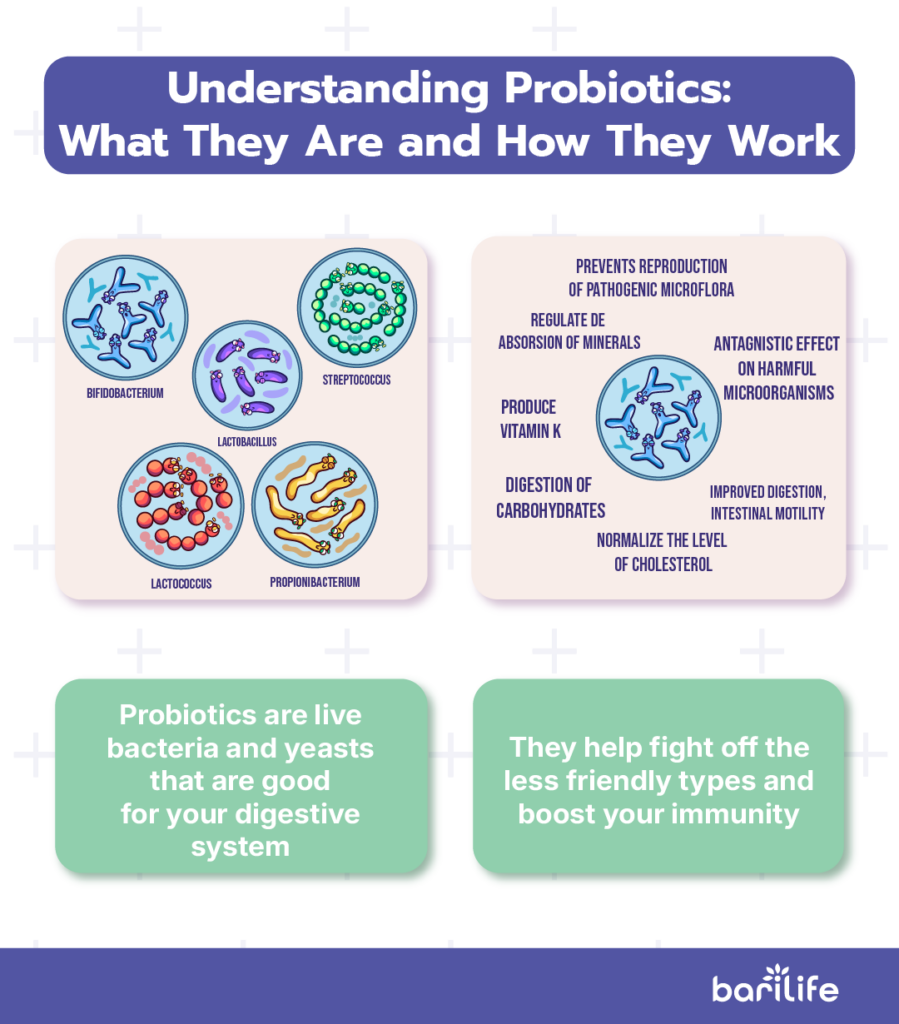
In the context of bariatric multivitamins with iron and bariatric vitamins chewable, probiotics may also support better nutrient absorption.
Probiotics are naturally found in fermented foods and some yogurts. You can also get probiotics by taking a bariatric probiotic supplement .
While people often think of bacteria as harmful, your digestive system and other parts of your body contain large amounts of healthy bacteria and yeasts. These organisms help your body perform necessary functions like digestion and supporting your immune system. Health experts refer to these collections of healthy organisms as your microbiome.
It’s important to maintain a healthy microbiome. However, antibiotics, some illnesses, and a poor diet can disrupt your microbiome.
Experts have discovered that people with obesity often have disrupted microbiomes, and bariatric surgery can further disrupt this balance. This makes incorporating fiber after bariatric surgery and taking a probiotic vital to help boost your microbiome and overall health.
Different Probiotic Strains Beneficial for Gastric Bypass Patients
After bariatric surgery, the environment in your digestive system may be more friendly for probiotics to survive. This is especially true after gastric bypass surgery.
Research on probiotics and specific bacterial strains after bariatric surgery is still limited, but some studies have found positive results.
For example, one study found that people who took probiotics for several weeks (either Clostridium butyricum or Bifidobacterium longum BB536) after gastric bypass surgery had fewer digestive problems, better quality of life, and higher levels of vitamin B12.
Some strains of probiotics, like Lactobacillus fermentum and Bifidobacterium lactis, are even known to produce B vitamins, which could help prevent deficiencies.
These findings make probiotics an exciting option for supporting vitamin and gut health after surgery.
While more research is needed, other strains that may be beneficial after bariatric surgery include:
- Lactobacillus rhamnosus: This strain is known for supporting digestion and reducing gastrointestinal issues, such as bloating or diarrhea, that are common after gastric bypass surgery.
- Bifidobacterium lactis: This strain can help improve nutrient absorption and enhance gut barrier function, which is critical after bariatric surgery due to changes in the digestive system.
- Saccharomyces boulardii: This is a beneficial yeast that has been shown to help prevent and manage gastrointestinal infections and diarrhea, which bariatric patients may be susceptible to post-surgery.
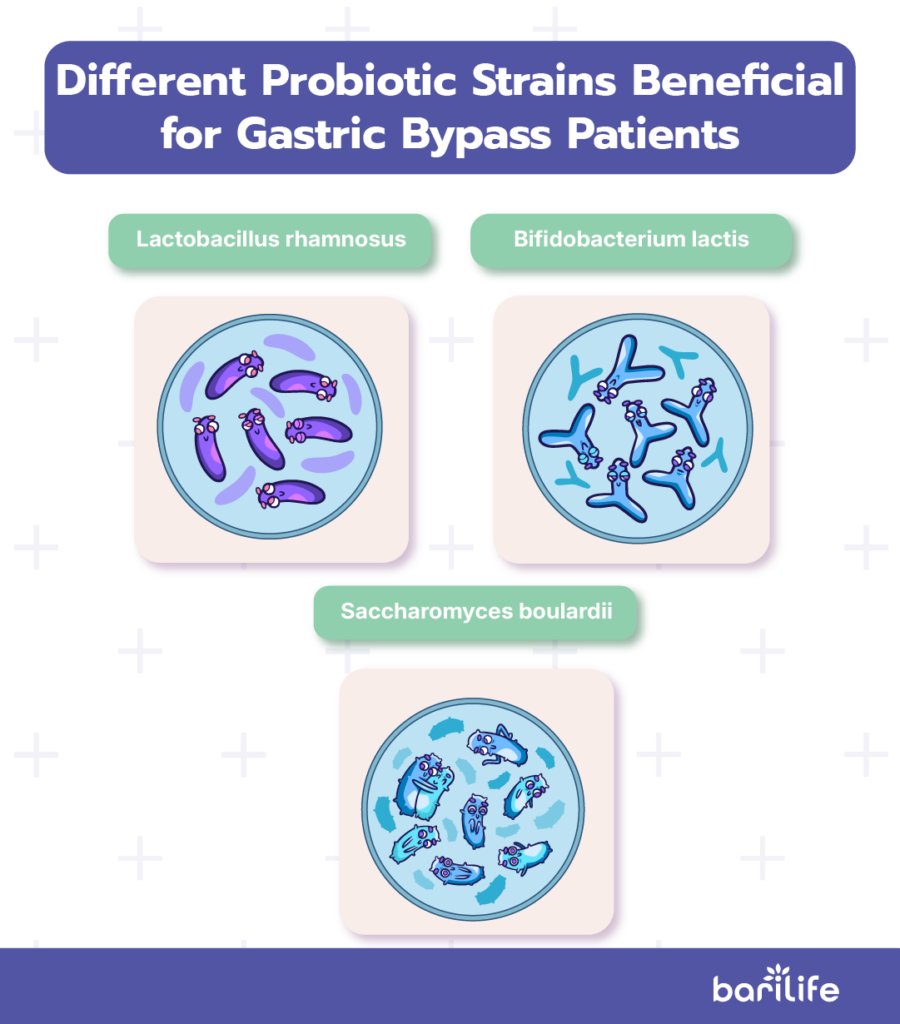
Probiotics and Weight Loss: What the Research Shows
Some studies have examined how probiotics affect how the body extracts energy from food and how much energy the body stores. However, many studies are animal studies, and more research is needed to determine whether the effects are the same in humans.
Also, the results from the studies were mixed. For example, one study gave people fermented milk with a Lactobacillus gasseri probiotic strain and found that the people lost fat, reduced their waist and hip size, and lowered their body mass index (BMI). However, another study with Lactobacillus gasseri didn’t show much weight loss.
A review of several studies found that probiotics (mostly from the Lactobacillus family) helped reduce body weight and fat in some trials but had no effect in others
The takeaway from these trials is that the impact of probiotics on weight loss can vary and may depend on the strain, amount taken, and personal characteristics such as age, gender, and starting weight.
Benefits of Probiotics After Surgery
Probiotics offer several benefits after surgery.
For one, they help restore your gut microbiome, which will have been disrupted by medications you received during surgery. Having a healthy microbiome supports your immune system function.
A gastrointestinal surgeon outlines several beneficial reasons for taking a probiotic after surgery:
- Reducing postoperative infections
- Reduce surgical site infections
- Helps the digestive system return to normal motility
- Prevent diarrhea caused by antibiotics given during surgery
- Prevent leaks in the digestive system
Incorporating Probiotic-Rich Foods into Your Bariatric Diet
Incorporating probiotic-rich foods into your everyday diet is a simple and effective way to support your gut health.
Dairy-based products like yogurt and kefir are excellent sources of probiotic strains such as Lactobacillus and Bifidobacterium. These foods are also protein-rich and have a smooth and easy-to-digest texture.
Fermented foods such as sauerkraut, kimchi, and miso also contain probiotics that support your digestive health.
While it’s good to incorporate these foods into your diet, it’s still crucial to practice portion control, as overeating can lead to discomfort.
It’s important to consider best calcium citrate for bariatric patients and best collagen for bariatric patients to support long-term recovery and nutritional balance.
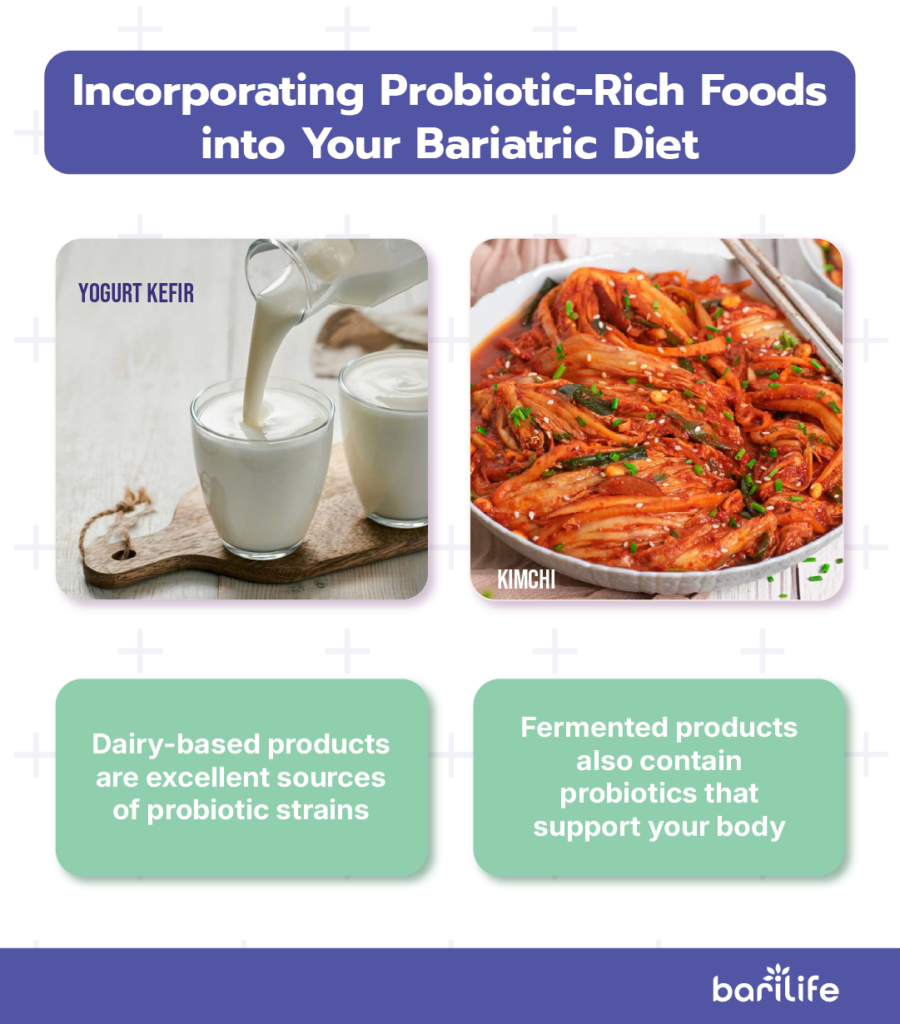
How to Choose the Right Probiotic Products
If you struggle to get enough probiotic-rich foods into your diet, you can also consider taking a probiotic supplement.
When deciding which probiotic to take, here are several factors to keep in mind:
- Variety of strains: Look for a probiotic with several strains of probiotics to enhance the strength and diversity of your microbiome.
- Check CFU count: Colony-forming units (CFUs) indicate how many live organisms are in the probiotic. Choose a supplement with at least 1 billion CFUs for best effectiveness.
- Ensure survivability: Choose a product that is formulated to survive stomach acid and reach your intestines where they are most effective. Look for probiotics with enteric coating or those containing spore-forming bacteria like Bacillus strains.
Bari Life offers a Bariatric Balance Probiotic supplement made specifically for people who have had bariatric surgery.
The probiotic contains eight different bacteria and 15 billion CFUs in each capsule. You only need to take one capsule daily to restore your digestive system’s microbiome.
Takeaway
Probiotics are live microorganisms that can offer various health benefits, especially for bariatric surgery. They help restore balance in your gut microbiome, support digestion, and may improve nutrient absorption, including vitamins like B12, which are often deficient after weight loss surgery.
While research on probiotics and weight loss shows mixed results, incorporating probiotic-rich foods or supplements into your diet can still offer several advantages, such as enhancing gut health, reducing gastrointestinal issues, and boosting your overall well-being.
If you want to learn more, why not check out these articles below:
- How much B12 should a bariatric patient take?
- Best iron supplement for bariatric patients
- How much iron should a bariatric patient take?
References
Kotzampassi, K., (2022). Why Give My Surgical Patients Probiotics. Nutrients.
Probiotics: Fact Sheet for Health Professionals. (2023). National Institutes of Health.
Virk, M. S., et al. (2024). The Anti-Inflammatory and Curative Exponent of Probiotics: A Comprehensive and Authentic Ingredient for the Sustained Functioning of Major Human Organs. Nutrients.
Wang, W., et al. (2024). Bifidobacterium lactis and Lactobacillus plantarum Enhance Immune Function and Antioxidant Capacity in Cats through Modulation of the Gut Microbiota. Antioxidants.


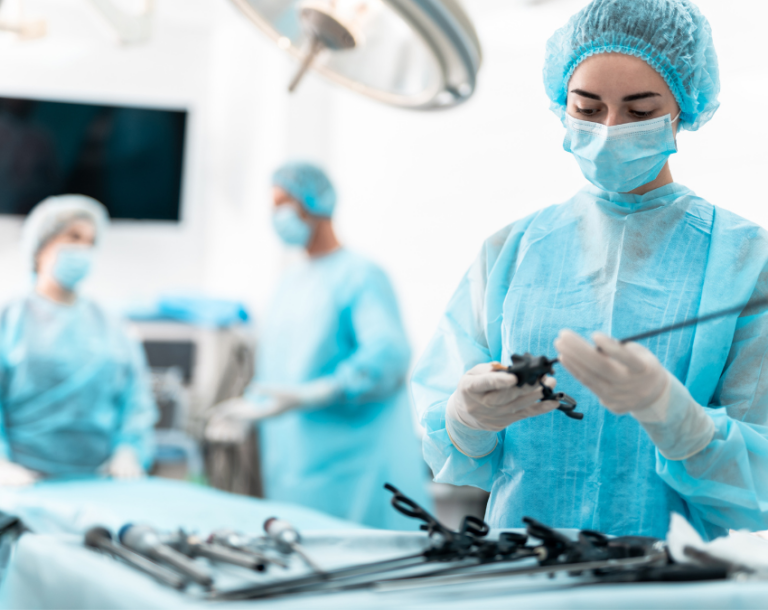
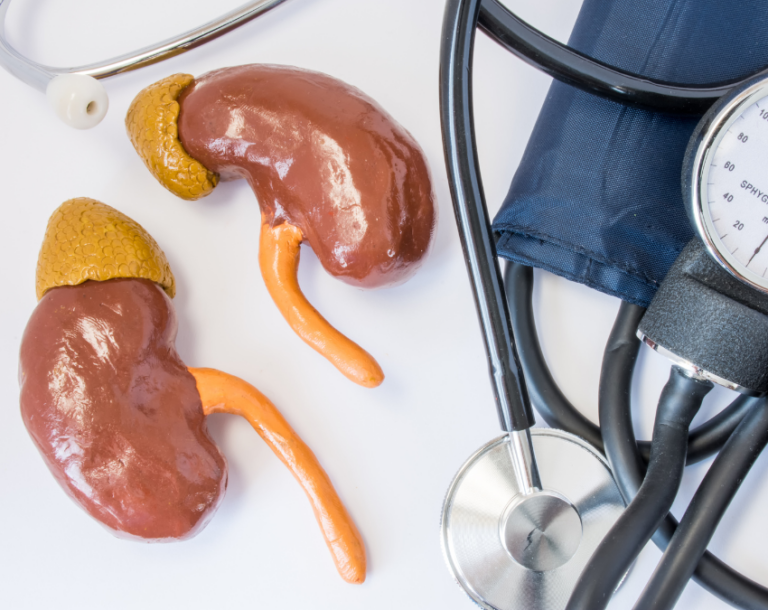
What are your tips and tricks to post-bariatric success?